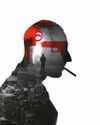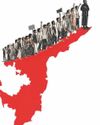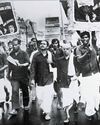Prøve GULL - Gratis
Stolen Lives, Buried Truths
Outlook
|August 11, 2025
What happens when the police chase the illusion of justice, not the truth?

On July 11, 2006, seven bombs tore through Mumbai’s local trains, killing 189 people and injuring over 800.
In the months that followed, the police announced that it had cracked the case. Twelve of the arrested men were tried and later convicted. Five were sentenced to death.
Last week—almost two decades later—the Bombay High Court acquitted them all. The judges ruled that the evidence against them was unreliable, contradictory and, in many cases, fabricated. At that moment, justice stood exposed—not because it had been delivered, but because it had long been denied.
What happens when law enforcement responds not to facts, but public opinion, the so-called ‘collective conscience’, as the police see it? What happens when the police attempt to satisfy the demand for retribution, rather than rely on evidence? The answer is stolen lives, buried truths and perpetrators walking free.
“The conviction of an innocent man is an insurance policy for the guilty person that now he will never be caught,” says advocate Yug Mohit Chaudhry, who along with his colleagues, Payoshi Roy and Siddhartha Sharma, represented some of the men acquitted by the court in the Mumbai blasts case. “The police closed this case not because they found the true culprits, but because they didn’t want to admit they didn’t know who the perpetrators were.”
In an ordinary murder case, a high court can—often does—acquit an accused if the evidence doesn’t hold up. It might be based on benefit of doubt or reassessment of witness credibility or technical reasons. But in terrorism cases, an acquittal wouldn't just hinge on doubt: it would require moral and legal conviction in the unquestioned innocence of the accused.
Denne historien er fra August 11, 2025-utgaven av Outlook.
Abonner på Magzter GOLD for å få tilgang til tusenvis av kuraterte premiumhistorier og over 9000 magasiner og aviser.
Allerede abonnent? Logg på
FLERE HISTORIER FRA Outlook

Outlook
The Big Blind Spot
Caste boundaries still shape social relations in Tamil Nadu-a state long rooted in self-respect politics
8 mins
December 11, 2025

Outlook
Jat Yamla Pagla Deewana
Dharmendra's tenderness revealed itself without any threats to his masculinity. He adapted himself throughout his 65-year-long career as both a product and creature of the times he lived through
5 mins
December 11, 2025

Outlook
Fairytale of a Fallow Land
Hope Bihar can once again be that impossibly noisy village in Phanishwar Nath Renu's Parti Parikatha-divided, yes, but still capable of insisting that rights are not favours and development is more than a slogan shouted from a stage
14 mins
December 11, 2025

Outlook
The Lesser Daughters of the Goddess
The Dravidian movement waged an ideological war against the devadasi system. As former devadasis lead a new wave of resistance, the practice is quietly sustained by caste, poverty, superstition and inherited ritual
2 mins
December 11, 2025

Outlook
The Meaning of Mariadhai
After a hundred years, what has happened to the idea of self-respect in contemporary Tamil society?
5 mins
December 11, 2025

Outlook
When the State is the Killer
The war on drugs continues to be a war on the poor
5 mins
December 11, 2025

Outlook
We Are Intellectuals
A senior law officer argued in the Supreme Court that \"intellectuals\" could be more dangerous than \"ground-level terrorists\"
5 mins
December 11, 2025

Outlook
An Equal Stage
The Dravidian Movement used novels, plays, films and even politics to spread its ideology
12 mins
December 11, 2025

Outlook
The Dignity in Self-Respect
How Periyar and the Self-Respect Movement took shape in Tamil Nadu and why the state has done better than the rest of the country on many social, civil and public parameters
5 mins
December 11, 2025

Outlook
When Sukumaar Met Elakkiya
Self-respect marriage remains a force of socio-political change even a century later
7 mins
December 11, 2025
Listen
Translate
Change font size
